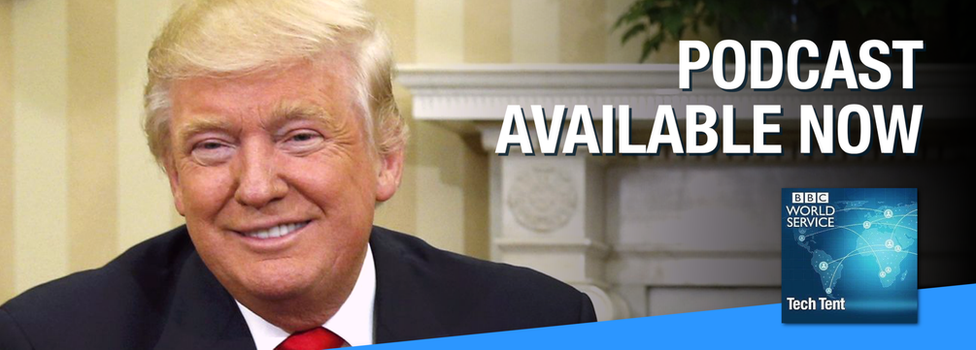Podcast: Did Donald's data trump Hillary?
- Published

Rory's podcast: Did Donald's data trump Hillary?
Stream the latest Tech Tent episode on the BBC website
Download, external the latest episode as a podcast

Donald Trump may not have had as impressive an operation on the ground as Hillary Clinton - but since June a very sophisticated data analysis operation had been underway.
This involved a British data science firm called Cambridge Analytica. On my podcast this week, we speak to one young British data scientist from that firm about the techniques used. David Wilkinson, who has spent six months in San Antonio, Texas where the operation was based, tells us that they were able to generate very granular data to help the campaign see where to direct its fire.
"It's not just about what demographic you are or where you're based - it's about what kind of things you're interested in and what kind of things you buy," he says.
One intriguing insight from his data - when the FBI reopened its investigation into Hillary Clinton's emails, it gave undecided voters "an excuse" to choose Donald Trump.
Facebook and fake news
On Thursday, I examined Facebook's role as a news platform in the election, and asked whether Mark Zuckerberg was aware of the power he wielded as a media tycoon.
Overnight he hit back at suggestions that fake news stories spread on the social network may have played a part in deciding the election winner.
On the podcast, Joshua Benton from the Nieman Journalism Lab at Harvard University tells us that the data shows that Facebook is hugely influential as a source of news for millions of Americans. He takes us through some of the fake stories about both candidates, which were widely shared during the campaign.
Counting babies in Tanzania
While Cambridge Analytica could give the Trump campaign detailed information about most American voters, governments in sub-Saharan Africa struggle to know of the existence of many citizens. In Tanzania, more than 80% of people do not have birth certificates, according to the government registration agency Rita.
However, mobile technology is providing an answer. We have a report from the BBC's Sammy Awami on a project to use mobile phones to register newborn babies in the Tanzanian countryside, where parents find it too difficult to travel to a government office.
Other countries - keen to have at least some basic data about their populations - are looking closely at the scheme.